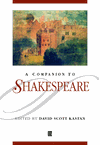Hearing Shakespeare's Dramatic Verse
Summary
Shakespeare wrote a Verse that was standard for his time, yet innovative and even revolutionary because of the power with which features he added to it transformed it. In this sense, it was old but new; it was Verse but not song, not singsong, not overregular in its thump, though it lived by the beat; but it also had to be believable as speech, as the kind of language people might use in talking to each other on the stage. As Verse speech, it had to be heightened at moments of tension; but in the theater all moments are moments of tension, so Shakespeare's Verse language had to reflect the Varying degrees and kinds of tension in the action of a play. If we listen to that language, we can hear how it achieves its drive and its color in part from the metrical system that Shakespeare received from older contemporaries (and Marlowe) but transmuted into a force of his own, edging and charging its effectiveness by devices and resources comparable in energy and grace to the tales of betrayal, revenge, romance, personal distress, and historical conflict they were designed to enact and express.



